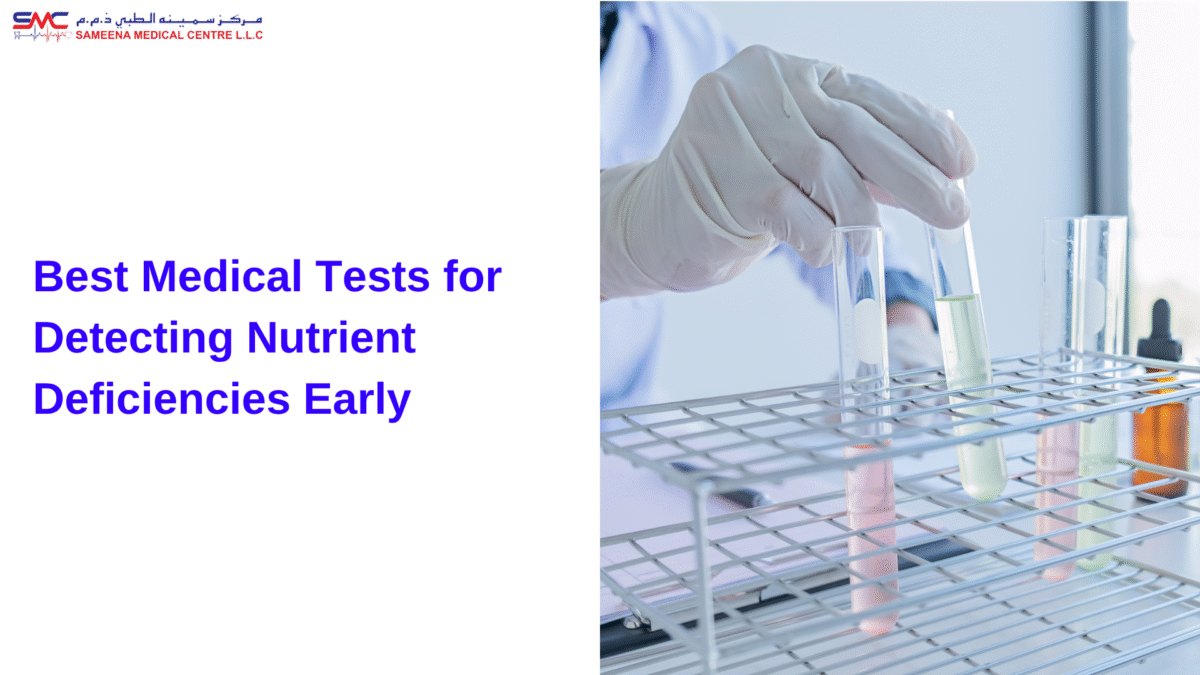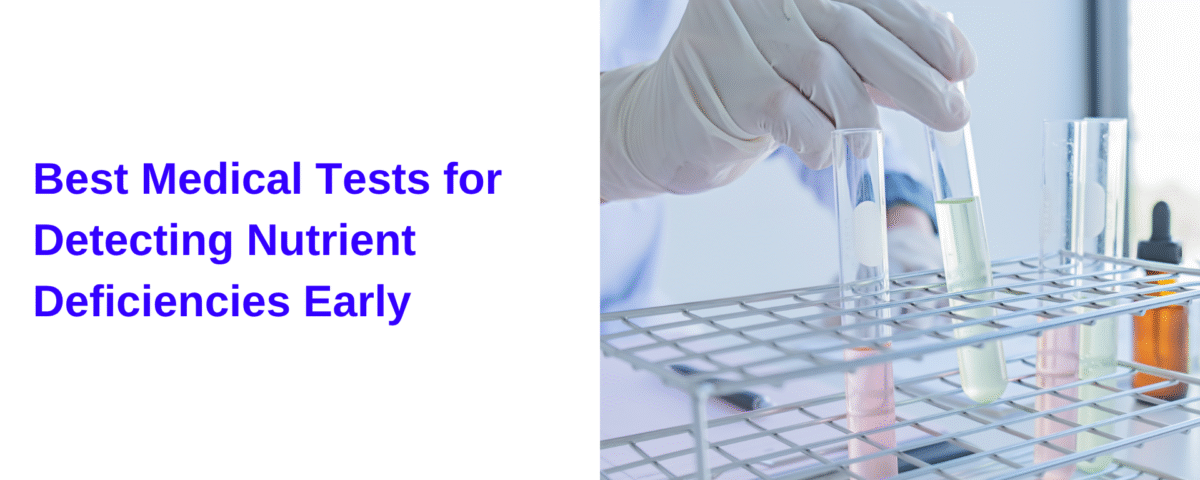
When Everyday Bloating Isn’t Normal: Medical Causes to Consider
July 28, 2025
What to Expect During a Complete Body Checkup at a Clinic
August 4, 2025Best Medical Tests for Detecting Nutrient Deficiencies Early

Some problems don’t shout, they whisper. Constant fatigue, dull skin, brain fog, or hair fall might not seem alarming at first, but they often trace back to a simple root: nutrient deficiencies.
The best way to stop these issues from escalating? Catch them early with targeted blood work. A well-planned medical test for nutrient deficiencies doesn’t just tell you what’s missing, it tells you where your health is headed next.
Key Tests That Help Detect Nutrient Deficiencies Early
If you want a clear picture of your nutrient status, these are the labs most doctors recommend. Each one reveals something important about not just what you eat, but how your body absorbs and uses it.
Complete Blood Count (CBC)
This basic test offers a window into your overall blood health. It can highlight issues like anemia, infections, or reduced immunity. These signs may point to underlying deficiencies in iron, B12, or folate.
Vitamin D Blood Test
Vitamin D deficiency is common, especially if you work indoors or avoid the sun. A simple test can measure your serum 25(OH)D levels and show whether you need supplementation. Early detection matters, as low levels can affect bone strength, energy, and immune health.
Vitamin B12 and Folate Levels
B12 and folate are essential for nerve function, DNA synthesis, and red blood cell production. Low levels may lead to fatigue, tingling hands or feet, concentration issues, and changes in mood. These tests are especially relevant for vegetarians, vegans, and older adults.
Iron Studies (Ferritin, TIBC, Serum Iron)
Feeling tired constantly? Iron deficiency could be the cause. An iron panel helps identify whether your body is absorbing and storing iron properly. Ferritin levels are key, as they reflect your iron reserves long before anemia develops.
Calcium and Magnesium Levels
These minerals support muscle function, heart rhythm, and bone health. Low levels may result in muscle cramps, numbness, trouble sleeping, or mood-related symptoms. Blood tests offer a helpful first view of potential imbalances.
Zinc and Other Trace Minerals Panel
Zinc, selenium, and copper play roles in everything from immune function to skin repair to reproductive health. A trace mineral panel can uncover gaps that affect healing, hair health, or hormone balance.
Homocysteine and Methylmalonic Acid (Advanced Deficiency Markers)
For deeper insight, these markers are valuable. Elevated homocysteine can suggest a deficiency in B12, B6, or folate, even when blood levels appear normal. Methylmalonic acid is a sensitive test for early-stage B12 deficiency.
Thyroid Panel for Related Deficiency Clues
While not a direct nutrient test, thyroid function panels often reveal indirect signs of deficiencies. Iodine, selenium, and zinc are critical to healthy thyroid activity. If thyroid results are off, your doctor may explore these nutrients further.
Signs You Might Need Nutrient Testing Even Without Symptoms
Deficiencies can develop gradually. You may feel fine for a while, then notice subtle changes that are easy to dismiss. Testing can catch things early, before they become long-term problems.
Some possible signs include:
- Feeling tired even after resting
- Trouble focusing or remembering
- Hair thinning or dry skin
- Cracks at the corners of your mouth
- Changes in mood
- Getting sick often
- Slow wound healing
Even without symptoms, testing is often worthwhile if you follow a limited diet, have a chronic illness, or take medication that affects nutrient absorption.
How Often Should You Get Tested for Nutritional Deficiencies
The right frequency depends on your age, medical history, and lifestyle. Here are general guidelines:
- Healthy adults with a balanced diet: every 1 to 2 years
- People with restricted diets (vegan, keto, etc.): once a year
- Individuals with chronic conditions: every 6 to 12 months
- Anyone recovering from illness or surgery: shortly after recovery, then again in a few months
If you start supplements or make big diet changes, follow-up testing helps measure their impact.
What to Expect During a Nutrient Deficiency Screening
Most screenings begin with a doctor asking about your health history, symptoms, and eating habits. Blood tests are usually done in the morning after fasting.
Depending on your needs, the doctor may order a full nutrient panel or specific tests. Some results are ready within a day, while others take a few days. Your doctor will go over the results with you and may suggest supplements, dietary changes, or further testing if needed.
Tips to Prepare for a Vitamin and Mineral Blood Test
1. Fast Overnight
Most tests require fasting for 8 to 12 hours. It helps ensure accurate readings.
2. Avoid Supplements Before Testing
Skip multivitamins or minerals for at least 24 hours unless your doctor advises otherwise.
3. Stay Hydrated
Drink water before the test. It can make the blood draw easier and help ensure clear results.
4. List Your Medications
Bring a list of everything you take. Some drugs can affect how your body processes nutrients.
Conclusion
Identifying a nutrient deficiency early can prevent more serious issues in the future. With a few targeted medical tests for nutrient deficiencies, you gain a clear picture of your internal health and how to improve it.
If you’re unsure where to start, the team at Sameena Medical Centre can guide you. They provide personalized testing and clear answers, so you can take action with confidence.





